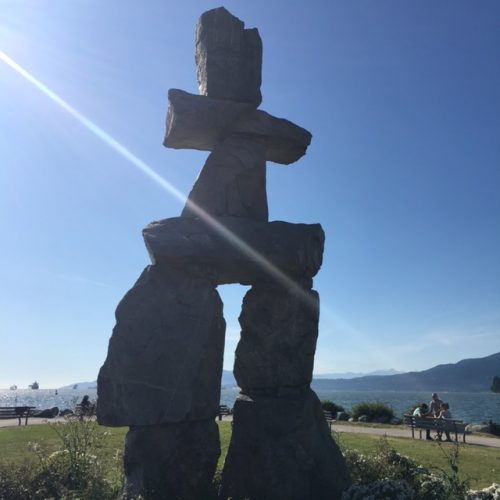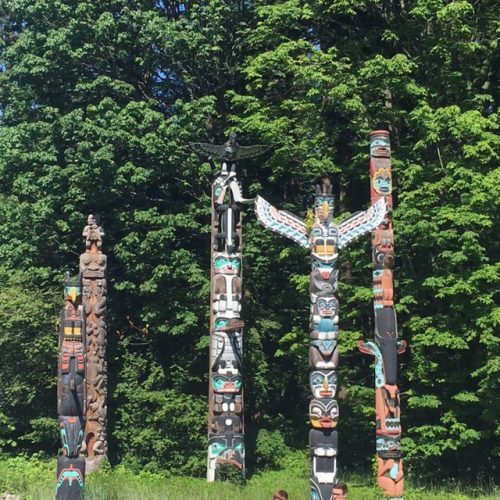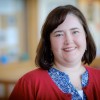The Atla Annual Conference was held in beautiful Vancouver, BC, June 12-15 this year. We had wonderful weather for the whole conference and it was also a fun sports week to be in Canada, with the Stanley Cup Finals, Toronto winning the NBA Finals, and the Canadian Football League season starting (Canadian football is…different!)! Vancouver is a very walkable city (almost 21,000 steps and three blisters on Saturday!) with amazing water or mountain views from pretty much anywhere.

All three of the plenary sessions and several of the regular sessions reflected our Canadian location, and Vancouver specifically, which was recognized as each started with a version of this First Nations acknowledgment: We acknowledge that we are meeting on the “traditional, ancestral, unceded territory of the henqeminem speaking Musqueam people.” (Adapted from language on the Xwi7xwa Library website, see below.) A few highlights from the plenary sessions:
- Juan Pablo Alperin, Simon Fraser University, Scholarly Communications Lab, Public Knowledge Project, “Understanding and Improving Incentives for Open Access”
- Alperin discussed his research into open access and the review, promotion, and tenure (RPT) process. The Review, Promotion, and Tenure Project looked at RPT documentation from over 850 college and university departments/units in the US and Canada to see what specifically they recommended regarding the use of open access publication venues. If RPT documents mentioned open access, it was frequently in a negative context and conflated (incorrectly) with predatory publication models. The study also found that while faculty most value publication in the venue that will reach the largest readership and a readership that can actually use their information (including the general public), they feel that their peers value impact factor and journal prestige more. He summarized it this way: “faculty care about the audience of their work” but “still do not explicitly value sharing more openly” so “we fall back on metrics and prestige, because it is what we believe others care about.” He suggested one way to reframe the RPT process in order to break through this stalemate was to evaluate how well the work that the faculty member is doing aligns with the goals and values of the department or unit they are a part of. This can remove the limitations we place on the “where” of the publication and focus on content and broader accessibility.
- Sarah Dupont, Aboriginal Engagement Librarian, Xwi7xwa Library, University of British Columbia, Indigitization Toolkit, “Accelerating Allyship: Indigenization, Decolonization, and Reconciliation in Librarianship”
- Dupont started by sharing her definitions of two terms in her context: decolonization and indigenization. Decolonization is the process whereby indigenous people reclaim their history and terminology. Indigenization is the use of Western structures but with indigenous elements. She gave the example of “indigenizing metadata” as using LC/metadata structures but incorporating native terminology that reflects their own context and history, or even just taking the concept of a “classification system” and making it their own, such as the Brian Deer Classification System. Dupont also spoke about the ways in which libraries and librarians can create connections and become allies with indigenous peoples: collections (sensitivity to cultural materials), allyship & inclusion (Indigenous Ally Toolkit), spaces (hosting indigenous art and languages), and programs & services (Indigitization Toolkit). The Indigitization project works with underserved indigenous communities to preserve and and digitize historical works. Importantly, there is no requirement to make those digitized works public, as there are many religious or cultural reasons that a group might not want to share an object or recording with the public, and the project doesn’t want them to be dissuaded from participating and preserving their heritage by such a requirement. Dupont’s presentation was really engaging and introduced me to some concepts and resources that I hadn’t had the opportunity to think about before and led to some really good conversations throughout the conference. The Xwi7xwa (whei-wha, “echo”) Library was featured in a Library Journal article several weeks ago, if you would like more information about their work.
- Patricia O’Connell Killen, Gonzaga University, Centre for Studies in Religion and Society, “Disruption and Depth: Pacific Northwest Religiousness, Faith Traditions, and the Quest for Wisdom in Our Time”
- Dr. Killen’s presentation of her research was of personal interest to me, as she has spent her academic career looking at religious life in Oregon, Washington, and British Columbia. She gave an overview of the history of Western/Christian religious traditions in the region and highlighted that there was never a dominant denomination or tradition in the area, as we see in other parts of the United States (Baptist in the south, Lutherans in the midwest, etc…), which led to an already smaller religious population being spread across a greater variety of religious groups. Because the region is also home to many transplants from other locations who have already broken many traditional social ties by moving, they may display either a lesser need to form social ties through religious groups, or a greater likelihood to move from group to group because those social ties are not strong. This has led to some distinctive characteristics relating to religion in these states/provinces:
- fewer children are religious in the denomination or group of their parents
- belief is considered completely private
- religious leadership is not based on institutional position but individual charisma
- As theological librarians, we were asked to consider:
- What counts as religion? What does that mean for collections?
- Translating and hearing deeply the questions library users are asking
- Making the case for the value of collections, for preserving history-events, thoughts, artifacts of practice, sensibilities, stories, narratives, traditions
- Sharing insight with others about what you are perceiving in how:
- users are making religious meaning, engaging in reflection
- the nature of the questions they are asking-theological assumptions?
- what constitutes religious identity and belonging for patrons
- how do you communicate the idea of faith traditions as worth encountering on a quest for wisdom?
- Dr. Killen’s presentation of her research was of personal interest to me, as she has spent her academic career looking at religious life in Oregon, Washington, and British Columbia. She gave an overview of the history of Western/Christian religious traditions in the region and highlighted that there was never a dominant denomination or tradition in the area, as we see in other parts of the United States (Baptist in the south, Lutherans in the midwest, etc…), which led to an already smaller religious population being spread across a greater variety of religious groups. Because the region is also home to many transplants from other locations who have already broken many traditional social ties by moving, they may display either a lesser need to form social ties through religious groups, or a greater likelihood to move from group to group because those social ties are not strong. This has led to some distinctive characteristics relating to religion in these states/provinces:
A few other sessions that were particularly helpful include:
- Two Research Courses, Two Miles Apart, Two Completely Different Approaches (Erica Durham, Columbia Theological Seminary; and Sarah Bogue, Candler School of Theology, Emory University)
- Erica and Sarah discussed the two different courses that they teach to support their Doctor of Ministry students. One of the several ideas they shared has prompted me to rethink my annotated bibliography assignment, which I am excited about! Rather than writing annotations of one resource per type (reference, book, article), Erica has her students compile a bibliography of 8-10 sources, and then answer a selection of questions (in chart form) about each resource. This seems to give the students a better chance to practice evaluation skills and makes them answer specific questions, rather than being able to write around them in an annotation.
- First Nations/Native Americans and Religion: A Bibliographic Conversation and Recommendations (Jane Elder and David Schmersal, Bridwell Library, Perkins School of Theology, Southern Methodist University)
- Jane gave an overview of things to consider about the history of outsider studies of First Nation/Native American populations: this is a really big topic; academic disciplines are a construct and this is a topic that crosses many “disciplines”; European primary sources of first encounters reflect populations where the traditional knowledge keepers were not accessible; these cultures communicated via oral rather than written histories which were likely recorded by missionaries rather than trained anthropologists; and most importantly, we need to practice critical humility by not making assumptions, by cross checking our sources, and by using sound methodologies. David shared how he developed his LibGuide for this topic and discussed issues he faced in regards to categorization, description, and terminology. This led to a discussion in the room which highlighted some excellent resources that I intend to purchase in the new fiscal year!
- Building Inclusive Spaces: Vancouver Public Library’s Trans, Gender Variant, and Two-Spirit Inclusion Initiative (Alex MacCutchan, Vancouver Public Library)
- The Vancouver Public Library system is a large organization, with 21 libraries, 750 staff members, and 6 million visitors a year. Inclusion and creating welcoming spaces are core values of the library and they have been working specifically over the last few years with the trans, gender variant, and Two-Spirit communities to that end. They are working in the areas of: programs and services; human resources; public spaces, facilities, and signage; community consultation and public partnerships; and communications and data. Within the human resources section on allyship, I found these descriptions relating to an ally to be particularly helpful:

Vancouver Public Library - informed
- Know the terminology
- Never stop learning and unlearning
- Open your mind
- We all have privileges, what are yours?
- aware
- Ask when you are not sure
- Welcoming and supportive
- Acknowledge and accept criticism
- Respect and listen, “speak up, not over”
- Equality and inclusiveness
- active
- Ally is a verb!
- Change negative behaviour
- Teach, don’t preach!
- Identify ways to increase awareness
- Values Voices Validates
- Empower each other
- informed
- The Vancouver Public Library system is a large organization, with 21 libraries, 750 staff members, and 6 million visitors a year. Inclusion and creating welcoming spaces are core values of the library and they have been working specifically over the last few years with the trans, gender variant, and Two-Spirit communities to that end. They are working in the areas of: programs and services; human resources; public spaces, facilities, and signage; community consultation and public partnerships; and communications and data. Within the human resources section on allyship, I found these descriptions relating to an ally to be particularly helpful:
- Beauty, Embodiment, and Stewardship: Theological Libraries and Theological Ecology (David Kriegh, St. Patrick’s Seminary and University; Alex Strohschein, John Richard Allison Library, Regent College; Sandy Shapoval, Phillips Theological Seminary)
- This panel was sponsored by the Public Services Interest Group, on whose board I serve. The panelists discussed the various ways they personally, professionally, or institutionally incorporate ecological perspectives into their work in theological organizations. This included the resources that their denominations have created to support climate justice, liturgical practice, institutional resources disinvestment, and volunteer organizations. There was a good discussion of the competing issues that must be weighed as decisions are made, i.e., print books and trees v. ebooks and rare earth minerals/energy use in data farms, accessibility of print over time v. obsolescence of e-formats, ILL sharing v. resources used to transport items, etc…
As always, I learned a lot at the Atla Conference! If you want more information about any of the sessions described above, any of the sessions I didn’t get to share about, or the interesting institutional changes that Atla is working through right now, I would be happy to talk with you!



6 Comments on ‘Kaeley @ Atla 2019’
This sounds like a fascinating conference! Would be really interested in seeing the bibliography entry review chart form.
I agree with Tanya! I would like to see the chart as well. Also, thanks for the great post–sounds like a fabulous conference.
What a rich conference! I’m not surprised that OA is incorrectly conflated with predatory publishing and viewed negatively; that’s not only in theological librarianship. Happy to know that the conversations around decolonization are also happening in Atla…these are critical and it’s good they are happening across our profession.
I appreciate the indigenization concept – I’ve heard about decolonizing being the bare minimum, so it’s nice to have some framing for what’s next. Sounds like a wonderfully wide-ranging conference with a lot to bring home!
I feel like the conference was both a spiritual and an intellectual feast!
I love the info on T&P and OA but am at a bit of a loss as to how to correct it 🙂